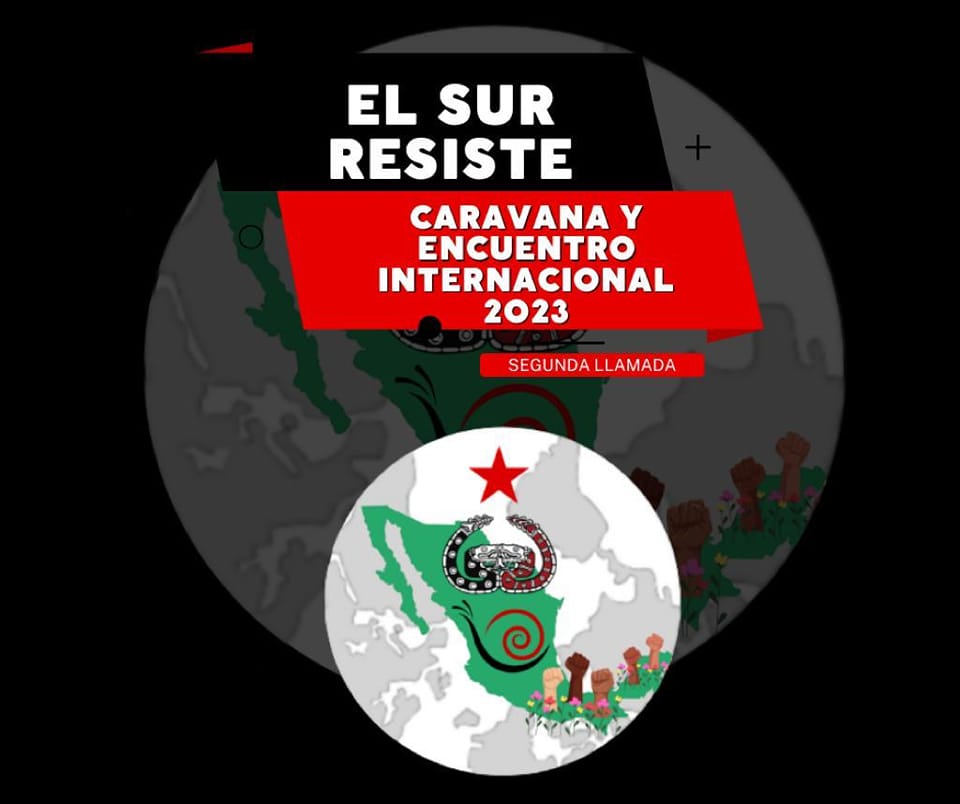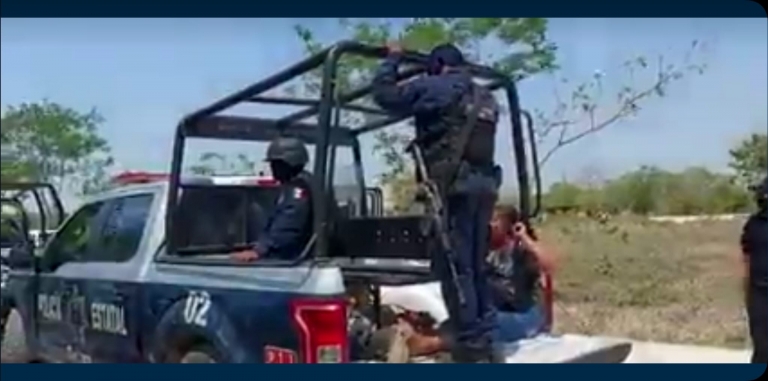April 25, 2023
#The South Resists: Pijijiapan, El Progreso and Tonalá
The fight for the right to electricity, against the imposition of gas pipelines and the militarization of the territory.
El Progreso, Pijijiapan
The Caravana El Sur Resiste The South Resists, left from Ejido La Gloria on communal land, where the Regional Autonomous Council of the Coast of Chiapas carries out various activities related to learning and sharing knowledge about agroecology and eco-techniques. From there we moved to the communal land, Ejido El Progreso, where a march and political gathering were held.
There the Autonomous Council spoke, sharing their experience of 30 years in struggle, which has focused, but not limited to, denouncing and resisting the high electricity rates of the Federal Electricity Commission. The Council demands that it be granted the constitutional recognition of electrical energy as a human right, guaranteed by the Mexican State.
“Why do we have to choose between eating, clothes, and paying a bill of 1,500 pesos or 3,000 pesos? We are peasants, workers, fishermen; we should not have to pay these fees. We demand, just as there are energy companies in Chiapas, that we have the right to have light.”
Members of the Autonomous Council also emphasized that they organized against other problems such as the imposition of projects that promote a supposed development but that, instead, only bring negative environmental and economic effects for its community members. Violence against women and the lack of respect for the rights of the communities were also problems mentioned at the gathering.
One woman spoke of how the government promised roads, hospitals and schools in exchange for allowing mining projects to take place. However, the communities have resisted and have organized to prevent the mines from reaching this region. The Autonomous Council also works to increase awareness in the communities, warning about the empty promises the government claims to exchange for accepting projects of all kinds.
There is also talk of the government’s intention to take over everything: water, resources, food, the forests, and even of the sons and daughters of the community. In light of this, the community mentions continuing fighting and resisting this robbery, lie and imposition in its territory.
“It is about the dispossession of everything… they want to take over our decisions, our resources, they are taking over the family, the water, the air. All we need to live, they want to be in control. In parts where there is no organization they have succeeded, in other places, such as here, we have managed to resist.”
Tonalá, Chiapas
After visiting the community of El Progreso, the Caravana El Sur Resiste advanced towards the city of Tonalá, Chiapas, where another political gathering organized by the Tonalteco Civil Resistance Committee was held in front of the city’s City Hall.
There, they discussed the megaprojects referred to as the “Transisthmic Corridor” and the project known as the “Tren Maya”. The voices of the members of several communities of the Isthmus of Oaxaca, of Veracruz, of the Otomí community currently residing in Mexico City and in the town of Santiago Mexquititlán, rejected these two projects for imposing a politics of exploitation and its violations on the rights of the Original Peoples.
It was mentioned how these two projects are in themselves a project to exterminate the Mexican Southeast, as the mega projects bring with them many other projects that benefit foreign industries and not local communities, as it has been argued. This includs projects for the tourist industry, real estate, energy, miners, textiles, maquilas, agro-industrial, and fishing industries amongest others.
To exemplify this situation, the Federal Government mentioned its intention to build a network of gas pipelines that would connect Guatemala with the Isthmus Region and the Chiapas coast (including the city of Tonalá).
The gas pipeline mentioned by the members of the Caravana El Sur Resiste is not the only one planned for the region. In various meetings of energy and oil companies, during the past six-years, and to this date, it has been communicated by the Federal Governments, and the private sector, the intention to connect the gas pipelines. Simulataneously connecting the gaspipelines with the Mayan Train Project and the Trans-Isthmic Corridor – in the following regions:
· PIPELINE TEXAS-TUXPAN-, VERACRUZ, – DOS BOCAS, TABASCO, with a length of 700 km and an investment of 5000 million dollars
· PIPELINE: CACTUS, OAXACA-DOS BOCAS, TABASCO, with a length of 60km and an investment of one billion dollars
The same statements from the private sector regarding this macro-network of gas pipelines speak to the plan to grant said projects to private investment, which reinforces the arguments of the communities within the Caravana El Sur Resiste who speak of these projects as initiatives to benefit foreign mega-companies and private capital.
Militarization and migration
As has been discussed in various investigations and as the communities have mentioned, the negative effects of the Mayan Train and Trans-Isthmic Corridor death projects extend beyond environmental destruction. There is also talk of an increase in the military presence of the National Guard and from other police, paramilitary and drug trafficking forces; therefore, an increase of violence against the people who inhabit these regions.
In Chiapas, for example, the presence of military camps and the National Guard has increased, many of these barracks have been positioned in proximity to Zapatista base communities.
One of the objectives of the Mayan Train and the Trans-Isthmic Corridor is to create mega industrial zones throughout the Southeast region, which in addition to converting the Original Peoples into cheap labor for various industries; it becomes a containment zone for migrants from all over the world who begin their transit to the United States through Chiapas, Yucatan and other routes.
The impacts of this policy are already tangibly perceived in the Chiapas area and the next areas that follow the Caravana del Sur Resiste.
During our journey from Tonalá, Chiapas to Puente Madera, Oaxaca, we passed more than 9 checkpoints with personnel from the Mexican Army, the National Guard, the State Police, and the National Institute of Migration, who stopped the various Caravan transports. On at least 7 occasions, they photographed the cars, and in two insistances they got on the buses photographing the participants.
At the checkpoint that marks the division between Chiapas and Oaxaca, in addition to being photographed by the official forces of repression of the Mexican State, we were photographed by people dressed as civilians, who were transported on motorcycles and who followed our journey for the first few meters after passing the retainer. We do not know the nature and purpose of these people, but we noted with the utmost caution their presence close to the military elements.
Throughout the journey, we were able to observe various groups of people who travel the long roads on foot, and who, upon catching a glimpse of the aforementioned roadblocks, enter the undergrowth that flanks the paving roads. Many times, other risks await them on these roads, such as exploitation and trafficking at the hands of organized crime groups often in collusion with local authorities, the army, and other police forces.
In the small part that we were able to visit in the state of Chiapas, the impacts of the Tren Maya and Corredor Transístmico megaprojects are already being experienced in the policy of militarization and retention/persecution of people in transit to the north.
The negative impacts in environmental and social matters are slow, but it is foreseen in the near future, the communities call to resist these megaprojects and the various projects that they carry with them; if they are not resisted, the environmental and social catastrophe is perceived closer than ever.
To end the day, the Caravan was received in the community of Puente Madera with members of the community carrying torches and shouting slogans in their iron determination to defend the territory against the Interoceanic Corridor.
Translated by Sexta Grietas del Norte
Report by https://www.elsurresiste.org




